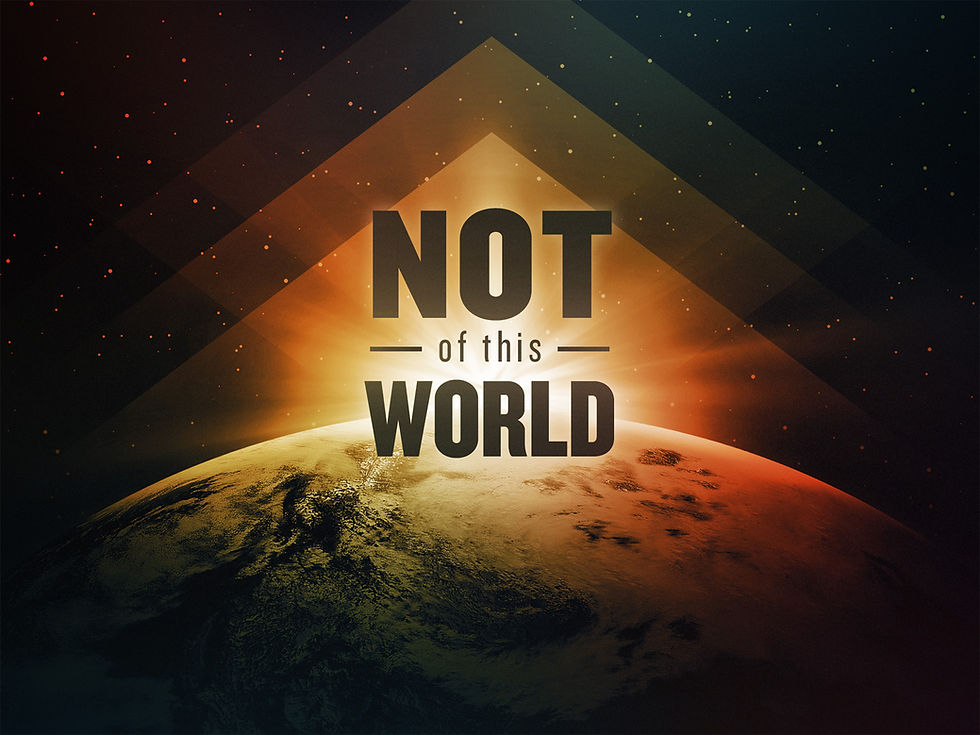Not of This World
- Herschel Raysman
- Jul 27, 2022
- 3 min read

Not of This World by FFOZ
After being convicted by Caiaphas’ kangaroo court, our holy Master Yeshua of Nazareth, the King of the Jews, entered the lavish, kingly palace of King Herod the Great for the first time. He stood utterly alone in front of Pilate and his men, flanked by Roman soldiers. The idols of the Roman gods adorned the governor’s hall, and the Roman standards decorated the walls. Pilate asked Him, “Are you the King of the Jews?” (Luke 23:3). Pilate sought a pretense on which to try and convict Yeshua as a criminal against Rome. The sedition and false-monarch claim seemed the strongest. Yeshua had been preaching, “The kingdom of heaven is at hand,” while leading crowds of messianic enthusiasts—a clear challenge to Rome’s authority over Judea and Galilee. The Master asked, “Are you saying this on your own initiative, or did others tell you about Me?” (John 18:34). Pilate snapped back, “I am not a Jew, am I? Your own nation and the chief priests delivered You to me; what have You done?” (John 18:35). The Master understood where Pilate was trying to lead the conversation and deflected the line of inquiry. He made it clear to Pilate that He was neither a revolutionary nor a Zealot terrorist. He was not attempting to start a political kingdom. He said, “My kingdom is not of this world. If My kingdom were of this world, then My servants would be fighting so that I would not be handed over to the Jews; but as it is, My kingdom is not of this realm” (John 18:36). The Master spoke cryptically and evasively. His “kingdom is not of this world” in the same way that His disciples were “not of the world” (John 15:19). The disciples did not conform to the world and its wicked ways because He had chosen them out of the world, but they were not invisible, spiritual, or up in heaven. Neither did Yeshua mean to imply that His kingdom was an invisible one that only existed in a “spiritual” sense or up in heaven. On the contrary, the Master anticipated coming in glory, treading down the armies of the nations, scattering the enemies of Israel, and taking up the throne of His father David. His kingdom was “not of this world” yet—it was of the World to Come, and it will one day conquer this world. He assured Pilate that He was not a Zealot revolutionary. If His kingdom were like a secular, worldly kingdom, He would follow the ways of worldly revolutions. He would have armed His disciples and instructed them to resist. Lichtenstein explains as follows:
Even though in his second coming to earth his kingdom would be “as in heaven, so also in earth” and in Jerusalem, the beloved city, according to the words of the prophets (and it is the same in Revelation 20) … His kingdom is not like kingships of this world in human power and conquest, by sword and spear with which he would kill the Romans … Rather it is of another form altogether: While it would be in Jerusalem, it would be a spiritual kingship, not by [physical] power and might, but by the Spirit, as the prophets said. (Commentary on the New Testament)
Years later, in a similar encounter, the Master’s grand-nephews stood before Emperor Domitian explaining that the kingdom of Messiah is not “worldly on earth, but heavenly and angelic, and it will be established at the end of the world when he will come in glory to judge the living and the dead” (Eusebius, Ecclesiastical History).

Comments